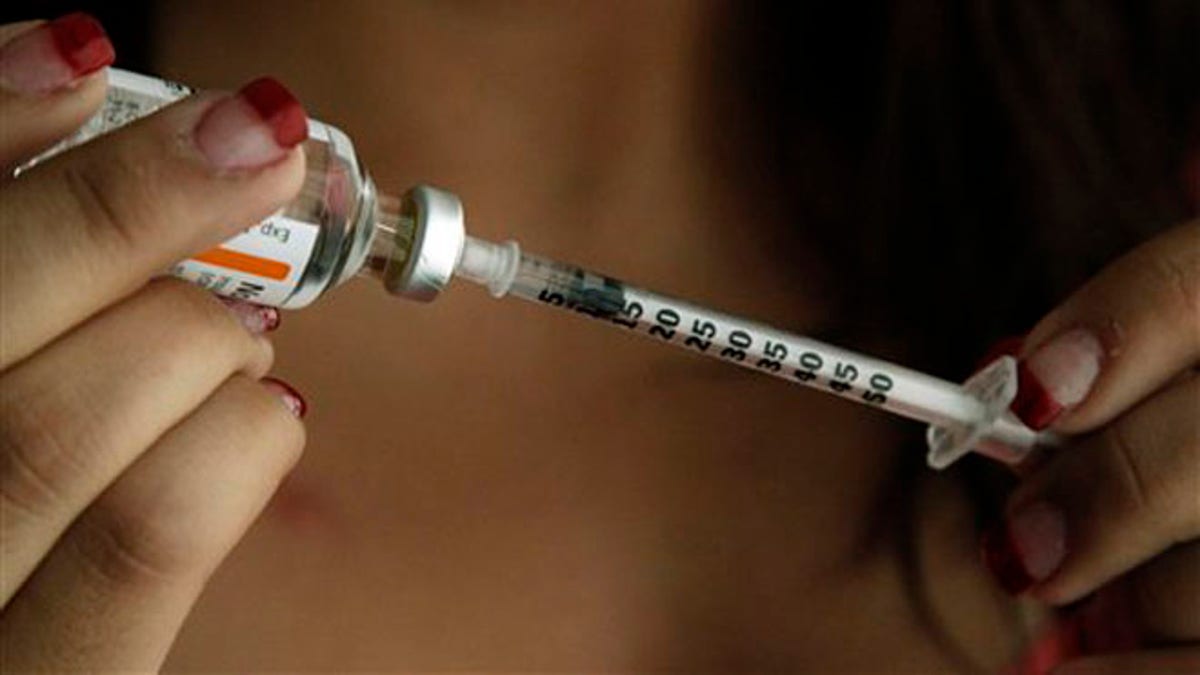
Judith Garcia, 19, fills a syringe as she prepares to give herself an injection of insulin at her home in the Los Angeles suburb of Commerce, Calif., Sunday, April 29, 2012. A major study, released Sunday, tested several ways to manage blood sugar in teens newly diagnosed with diabetes and found that nearly half of them failed within a few years and 1 in 5 suffered serious complications. Garcia still struggles to manage her diabetes with metformin and insulin years after taking part in the study at Children's Hospital Los Angeles. (AP Photo/Reed Saxon) (AP)
At a routine doctor's visit two years ago, Atlanta therapist Shane Blasko, now 37, got the news that some 1.9 million other U.S. adults hear every year. "I was devastated," she said. "I was too embarrassed to tell anyone at first." Like most diabetes sufferers, Blasko was significantly overweight—at 5-foot-4, she weighed 260 pounds. Her doctor prescribed drugs to help control her blood sugar, and said, almost flippantly, "You just need to lose some weight." The doctor suggested a class at a local hospital, but Blasko felt she needed more help. "I'd been trying to lose weight on my own without getting anywhere."
After some false starts, she found Atlanta Endocrine Associates—part of Atlanta Center for Endocrinology, Diabetes, Metabolism, and Nutrition. There, medical director Dr. Scott Isaacs, an endocrinologist and obesity specialist, offers an intensive weight-loss program designed for people with weight-related health problems, such as diabetes. In April 2010, Blasko started on the Decision Free plan. She received low-calorie entrees and shakes, met weekly with nurses who helped her manage her medical issues and with nutritionists who taught her how to put together healthy meals, and she attended regular support groups.
The plan worked, big-time. By February, Blasko had lost 50 pounds. She no longer needed meds to stabilize her blood sugar, or the drug she'd been on for high blood pressure; both were at normal levels. "At my last checkup, my doctor told me I basically wasn't diabetic anymore," marveled Blasko, now 100 pounds lighter than when she started. "I didn't know that was possible."
The end of diabetes?
You read that right: Blasko essentially reversed her diabetes. And, most people with type 2 diabetes—which afflicts 1 out of every 10 women in the U.S.—could do the same, according to Dr. Osama Hamdy, medical director of the Obesity Clinical Program at the Joslin Diabetes Center in Boston. "We've been treating diabetes for 40 years by adding more and more medications, with no big improvements," Hamdy said. "But if you act early, keep the weight off, and maintain a healthy lifestyle, you can put this disease in remission forever."
_________________________________________________
More From Health.com:
Could You Have Type 2? 10 Diabetes Symptoms
Eat These Foods and Fight Diabetes
Celebrities With Type 2 Diabetes
_________________________________________________
It's no secret that excess weight and diabetes go hand in hand, due to the powerful impact that pounds have on blood sugar. There's even a term for this unhealthy alliance: "diabesity." Yet the integrated focus on diabetes management and weight control found at centers like Isaacs's and Hamdy's is surprisingly rare.
"It's frustrating, Isaacs said. "Diabetes guidelines all say start with diet and exercise, but many treatment programs don't. Meanwhile, standard weight-loss programs are completely focused on diet and exercise, and no accommodations are made for changing medical conditions." When a diabetic loses weight, for instance, her medication needs may change.
The cost of a cure
So why isn't medically supervised weight loss a key component of every diabetes program? For one thing, shedding pounds is hard; Isaacs said that many diabetes experts focus on meds because they don't see much long-term success with weight management. Another major reason is cost. "Insurance often won't cover this kind of care, and many hospitals don't have the resources to offer it," Hamdy said.
Certainly, the price of treatment varies. Isaacs's program starts at $25 a week for classes, plus $80 to $100 weekly for food. The Joslin Center offers a 12-week program called Why WAIT, which features a diet and exercise plan and costs $5,000. (YOU-Turn is a seven-day version followed by six months of weekly phone coaching and support.) Sometimes these services are covered by insurance, but that depends on the patient and her plan. Either way, the approach is worth the money, Hamdy said. "The costs of this condition are huge. With the number of people with diabetes approaching 20 million in the U.S., we'd save so much if similar programs were implemented nationwide."
For former diabetics like Blasko, the payoff is obvious: "If not a penny of the program were covered, I'd still say it was worth it. I probably would have paid more."
